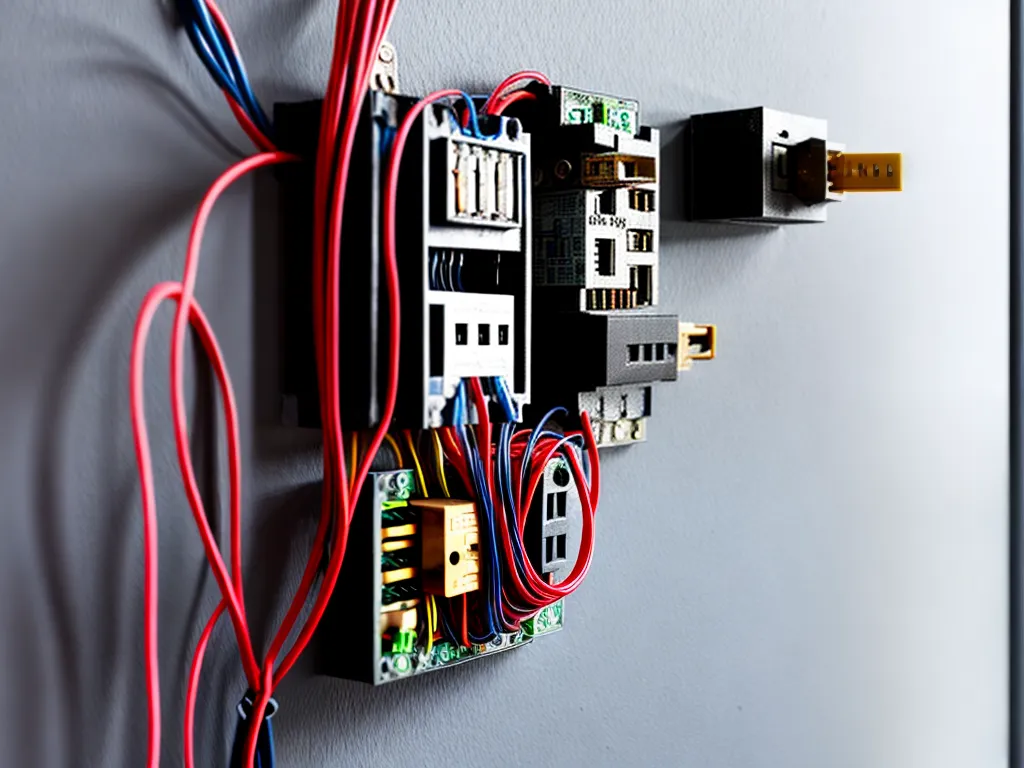
I've decided to take on some minor electrical projects around my home, but I don't have any formal training as an electrician. While basic home electrical work like installing a new light fixture may seem straightforward, electricity can be extremely dangerous if not handled properly. As a beginner, I want to ensure I wire my home safely and correctly without causing any hazardous issues down the road. Here is my guide to safely wiring my home as an amateur:
Learning About Home Electrical Systems
Before I start any electrical project, I need to educate myself on the basics of home electrical systems. Here are some key things I'll research:
-
Current - Measured in amps, current is the flow of electricity through a wire. Understanding how much current different appliances and fixtures require is crucial to ensure I use the proper gauge wiring.
-
Voltage - Measured in volts, voltage represents the "pressure" that pushes current through the system. Houses have either 120-volt or 240-volt service. Making sure I know the voltage I'm working with keeps me safe.
-
Wiring gauge - Wires come in different sizes and capacities. Choosing the correct size wire for the required current draw prevents dangerous overheating.
-
Circuit breakers - These safety devices cut power if there's an overload or short circuit. Knowing how to properly size and reset breakers is important.
-
Grounding - Proper grounding eliminates shock hazards. I'll learn best grounding practices for my projects.
-
Electrical code - Building codes contain important rules for safe electrical work. I'll study my local codes to ensure any wiring I do meets standards.
Spending time reviewing electrical fundamentals gives me the baseline knowledge I need to work safely. I'll use library books and online resources to build my understanding before wiring anything.
Identifying Needed Wiring Projects
Once I have a handle on basic electrical concepts, I can survey my home to identify projects where adding or replacing wiring would be beneficial:
-
New lighting fixtures - Perhaps I want to install recessed ceiling lights in a room or mount a new exterior light by the front door. I'll need to run new wiring to these locations.
-
Outlet upgrades - Outdated two-prong outlets should be replaced with modern grounded outlets for safety. Running a new ground wire may be required.
-
Appliance circuits - For a new appliance like an air conditioner or electric vehicle charger, I may need to run a new dedicated circuit with proper capacity.
-
Extension cords - Temporary extension cords should be replaced by installing permanent outlet and lighting circuits. This avoids tripping and fire hazards.
Carefully evaluating where new or upgraded wiring would help make my home safer, more functional, and more energy efficient helps me prioritize projects. I'll tackle simpler jobs like new light fixtures before complex tasks like adding appliance circuits.
Acquiring Proper Tools and Materials
Wiring a house, even for simple projects, requires having the right tools and materials:
- Wire strippers - Allows me to neatly strip insulation off wires to make connections
- Voltage tester - Helps me confirm power is off before working on wires
- Cable ripper - Makes opening up walls and fishing cable easier
- Staple gun - Secures loose cables running through studs and joists
- Wire nuts - Twists wires together for secure connections
- Electrical tape - Covers splices and connections to prevent shorts
For materials, I'll carefully choose the correct wire gauge, boxes, connectors, and fixtures for each project. When purchasing, I look for labels indicating the products meet electrical and building code standards for safety.
Working Safely on Powered Circuits
Whenever possible, I turn off power at the main breaker before wiring. Unfortunately, some projects require working on live wires. For these, I take precautions:
- Wear rubber-soled shoes and gloves to avoid shocks
- Use insulated tools designed to prevent contact with live conductors
- Avoid touching any bare wires or terminals
- Keep wires isolated from any metal junction boxes
- Work with one hand to reduce current flow through my chest
I also get professional assistance if I'm uncomfortable. Safety is paramount when dealing with live electric circuits - if in doubt, I call an electrician rather than risking a mistake.
Testing and Troubleshooting My Work
Once a wiring project is complete, I take steps to verify it was done properly:
- Inspect all connections are tight, clean, and insulated
- Double check correct wires are connected in outlets and switches
- Use a voltage tester to confirm power reaches new fixtures and outlets
- Check for hot spots in wires that may indicate an overloaded circuit
- Verify new lights and outlets function when turned on
- Test ground connections with a multimeter for continuity
Troubleshooting issues as I go and confirming functionality before finishing prevents problems down the road. I don't assume a project is complete until I've thoroughly tested my work.
Calling a Professional When Needed
When tackling complex or hazardous electrical jobs, hiring a licensed electrician is the safest route. I contact a professional when:
- Large appliances need new 220V circuits installed
- The main electrical service panel requires upgrades
- Feeder wires to subpanels must be replaced
- Knob-and-tube wiring needs remediation
- New circuits exceed my knowledge or comfort level
Though DIY electrical work can save money, it's not worth the risk of injury or property damage on high-voltage systems. Knowing when to call a pro ensures I don't jeopardize my safety.
By educating myself, hiring pros when appropriate, using proper tools, and working methodically, I can take on minor electrical wiring at home without formal training. Staying organized, avoiding shortcuts, and double-checking everything allows me to get the job done safely.